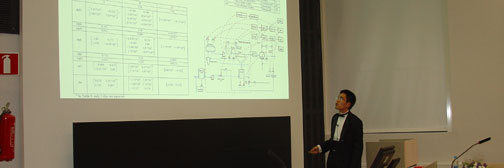| | Year 2014
Palash SarkarOnline Energy Balance Calculations for a BioGrate Boiler
The rise in the demand of an alternative source of energy that can substitute the depleting fossil fuel has introduced new challenges in process industries. Today, biomass fuel is increasingly used as a renewable source of energy used for power production. The BioGrate boiler is one of the latest technologies that utilize biomass fuel for power production. These boilers need to cater to the power demand of the market without any interruptions in their operations. However, the heat content of biomass samples differs depending on their place of origin, their composition and their moisture content, thus introducing fluctuations in power production. Hence, uninterrupted operation of the boiler requires an efficient process monitoring method which can detect disturbances as early as and take corrective measures.
The aim of this Master’s thesis is to develop a system for the mass and energy balance calculation for process monitoring of BioGrate boiler. These calculations are developed around each process unit of the BioGrate boiler using the measurements available at the Vilppula plant. However, since measurements inevitably contain random errors, a data reconciliation algorithm is developed to minimize the errors. The reconciliation algorithm ensures that the measurements satisfy the balance equations.
The literature part of this thesis discusses the literature on the modelling of boilers based on the mass and energy balance calculations and introduces the concept of data reconciliation. It also describes the commercial software that is currently used for process monitoring in power plants. Based on the literature part, the balance calculation and the data reconciliation algorithms are developed in the experimental part. Balance calculations at steady-state and nonlinear data reconciliation methods are used in this thesis. In addition, a graphical user interface is developed to provide a user-friendly tool for executing the algorithms. The results obtained from the algorithms are then used for fault detection.
The algorithms are successfully implemented and tested with industrial data. It was found that the discrepancies in mass and energy balances arise either due to sensor malfunction, or due to process faults. The time periods, during which such discrepancies occurred, are analyzed and discussed in this thesis. The algorithms can further be incorporated with other monitoring techniques to identify the locations of malfunctioning sensors and variables causing process faults.
Thesis electronical version can be downloaded from here
This info last modified 27 Apr 2024 by Jukka Kortela
|

